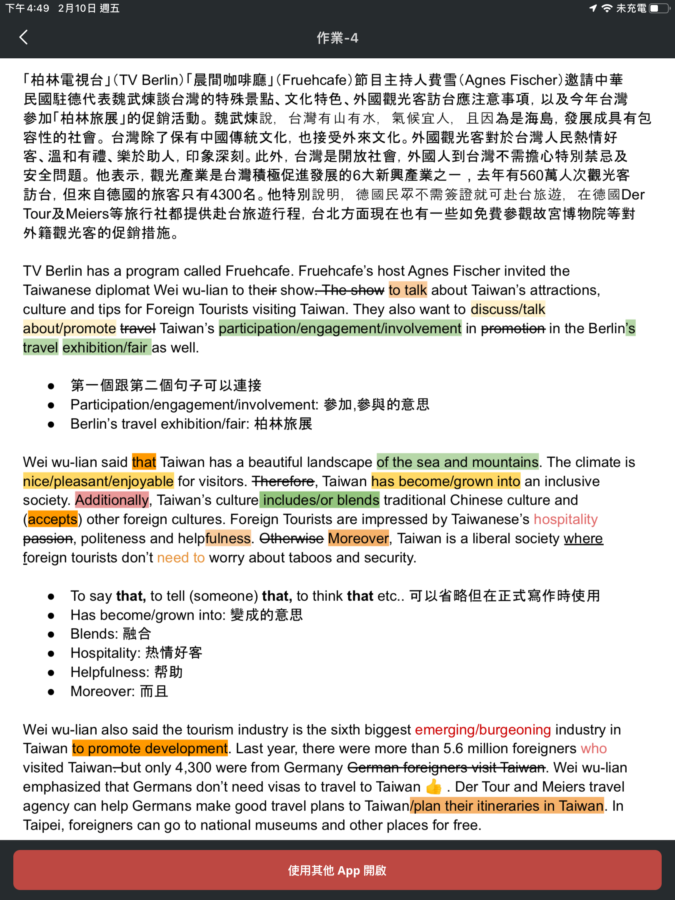長榮大學 翻譯碩士班(含在職專班)招生考試 翻譯
筆譯(英翻中)(50%)
Employment in Asian firms is booming—but for locals, not Western expats
The latest survey by Manpower, an employment consultancy, found that companies in India, China and Taiwan expect to hire more than firms in other countries during the first half of 2011. Western companies in all sorts of industries are continuing to push into Asia’s high-growth economies. This week, for example, Tesco, Britain’s largest retailer, announced a big expansion in China.
However, Joe Expat may not get much of a look-in. Graduates are flooding on to Asia’s job market from local universities, and Asians with degrees from Western ones are returning home. Since 2003 roughly 325,000 Chinese have returned after studying overseas—more than three times as many as in the entire two decades before. …The number of Chinese studying abroad and expected to return home afterwards continues to rise. Even Westerners with top-class MBAs are finding it tough. …
Since there is no longer so much need for foreign workers, Asian governments are tightening their visa rules. In 2008 Singapore granted 156,900 work visas to foreigners and less than half that number of jobs went to residents. Now the numbers are roughly equal. “There isn’t an overwhelming need to import young and enthusiastic people any more,” says Declan O’Sullivan, a director of Singapore-based Kerry Consulting.
It is not just a question of supply and demand, though. Big employers in Asia, especially those that have got burned in their past dealings with local governments, are putting a premium on local knowledge, language and connections. Recruiters say candidates with a demonstrable long-term commitment to a country, and ready-made guanxi (business and political relationships), get preference. The locals-first attitude to hiring extends up all the way to the most senior executive levels. Just as experience in Asia is coming to be seen as an essential career step in Western multinationals, the opportunities for recent graduates to gain such experience seem to be shrinking. – Excerpt from The Economist
筆譯(中翻英)(50%)
「柏林電視台」(TV Berlin)「晨間咖啡廳」(Fruehcafe)節目主持人費雪(Agnes Fischer)邀請中華民國駐德代表魏武煉談台灣的特殊景點、文化特色、外國觀光客訪台應注意事項,以及今年台灣參加「柏林旅展」的促銷活動。
魏武煉說,台灣有山有水,氣候宜人,且因為是海島,發展成具有包容性的社會。 台灣除了保有中國傳統文化,也接受外來文化。外國觀光客對於台灣人民熱情好客、溫和有禮、樂於助人,印象深刻。此外,台灣是開放社會,外國人到台灣不需擔心特別禁忌及安全問題。
他表示,觀光產業是台灣積極促進發展的6大新興產業之一,去年有560萬人次觀光客訪台,但來自德國的旅客只有4300名。他特別說明,德國民眾不需簽證就可赴台旅遊,在德國Der Tour及Meiers等旅行社都提供赴台旅遊行程,台北方面現在也有一些如免費參觀故宮博物院等對外籍觀光客的促銷措施。
TV Berlin has a program called Fruehcafe. Fruehcafe’s host Agnes Fischer invited the Taiwanese diplomat Wei wu-lian to their show. The show talked about Taiwan’s attractions, culture and tips for Foreign Tourists visiting Taiwan. They talk about travel promotion in the Berlin exhibition as well.
Wei wu-lian said Taiwan has a beautiful landscape. The climate is nice for visitors. Therefore, Taiwan is an inclusive society. Taiwan’s culture includes traditional Chinese culture and other foreign cultures. Foreign Tourists are impressed by Taiwanese passion, politeness and help. Otherwise, Taiwan is a liberal society. Foreign tourists don’t worry about taboos and security.
Wei wu-lian also said the tourism industry is the sixth biggest industry in Taiwan. Last year, there were more than 5.6 million foreigners visited Taiwan. But only 4300 German foreigners visit Taiwan. Wei wu-lian emphasized that German don’t need visas to travel to Taiwan. Der Tour and Meiers travel agency can help German make good travel plans to Taiwan. In Taipei, foreigners can go to national museums and other places for free.
